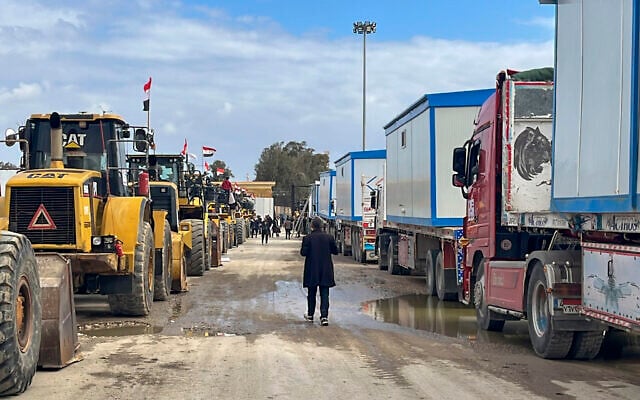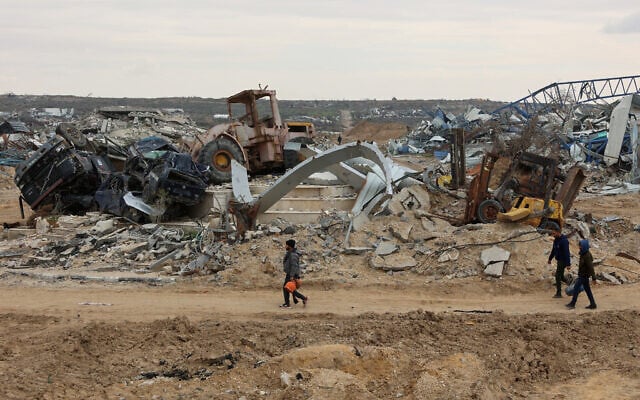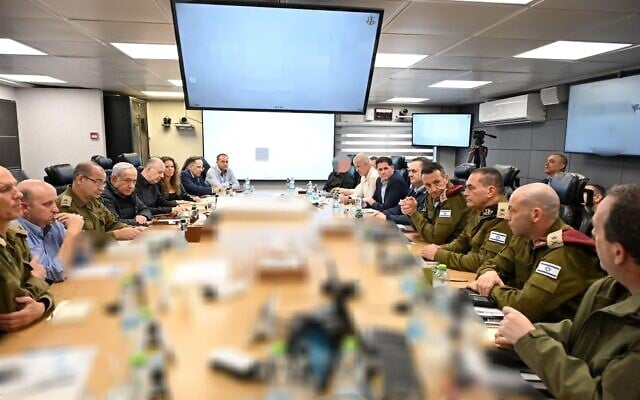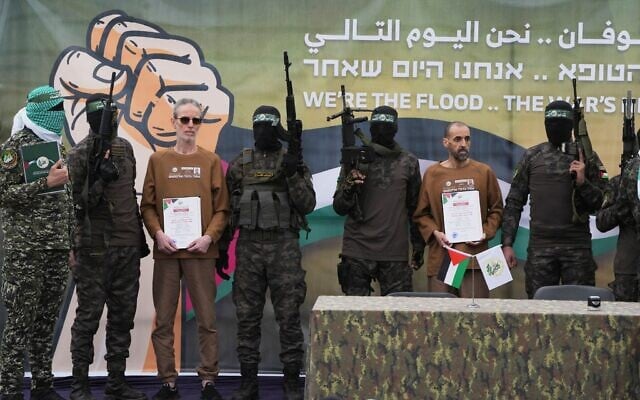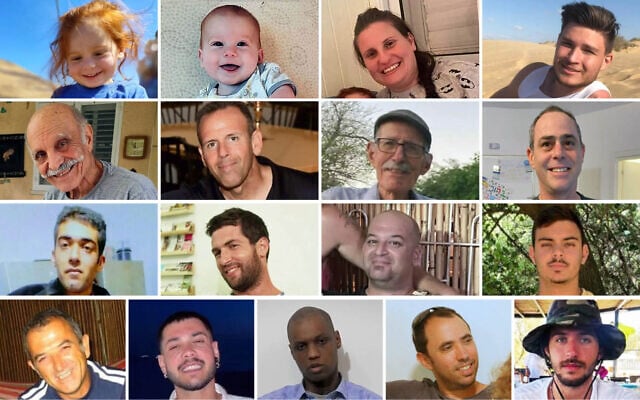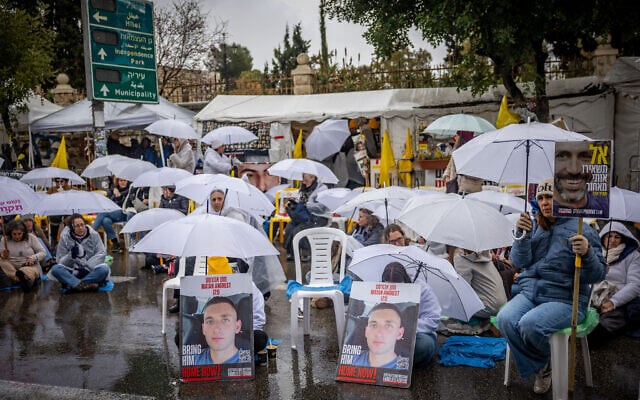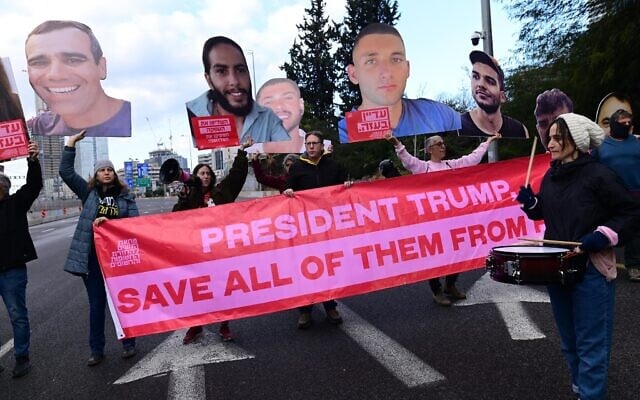


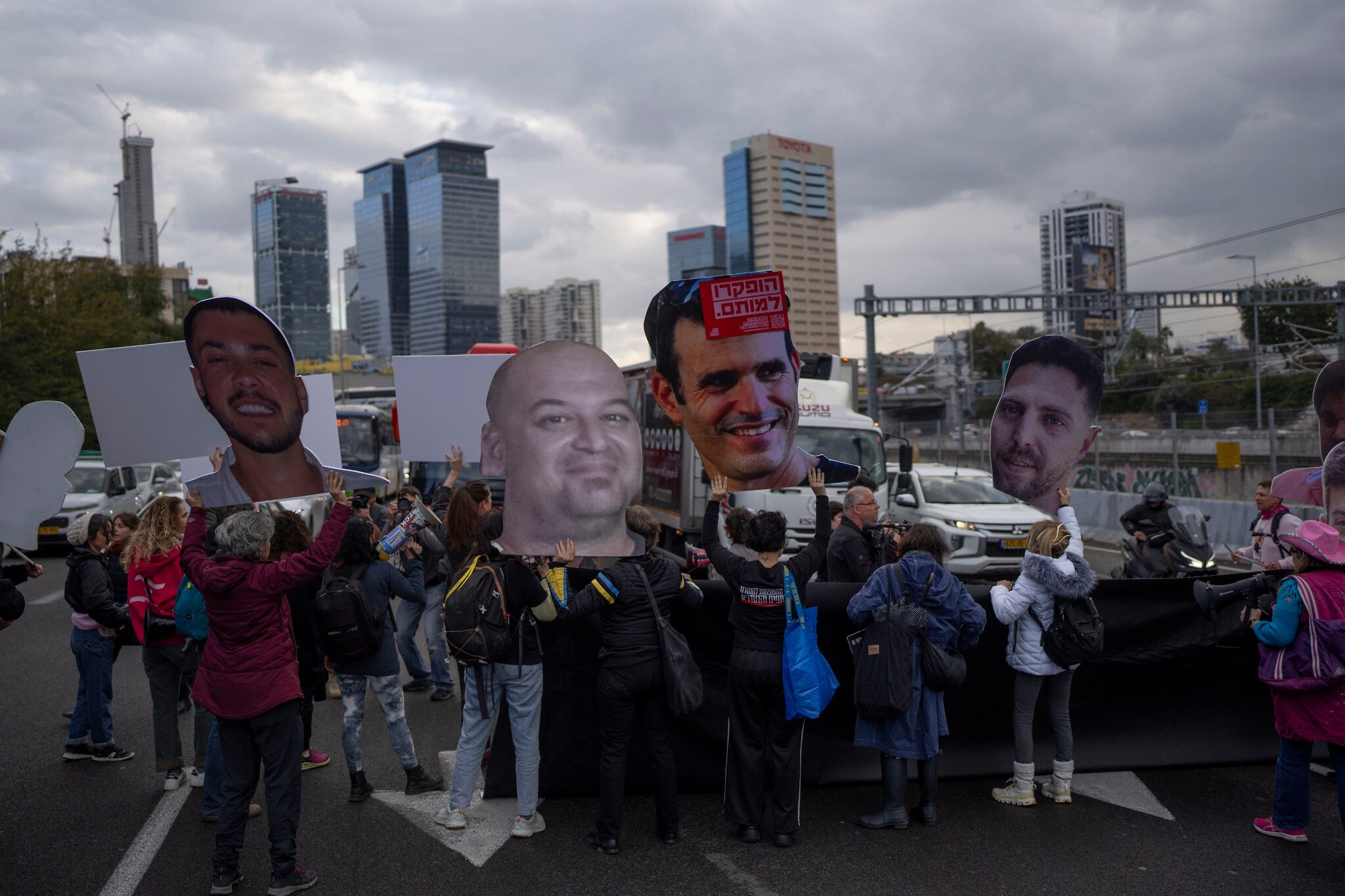
Hamas said Thursday it would release three Israeli hostages as planned Saturday, backing off a threat to delay the next release of captives after accusing Israel of failing to meet its obligations to allow tents and shelters, among other alleged violations of the truce.
Israel was reported to be pushing for further live hostages to be released in the upcoming days, but a senior Arab official told The Times of Israel that it was unlikely that Hamas would deviate from the original timeframe of the agreement.
Underscoring the fragility of the ceasefire and hostage release arrangement, a rocket was fired from Gaza for the first time since fighting halted last month, reportedly killing a Palestinian teen inside the Strip and drawing the second Israeli military strike in as many days.
In southern Israel, Prime Minister Benjamin Netanyahu and Defense Minister Israel Katz spent several hours huddling with top military commanders and security officials Thursday evening, as Jerusalem reportedly sought to pile more pressure on the Hamas terror group to begin releasing hostages sooner than previously agreed.
Israel has said it will resume fighting if the hostages are not freed, and appeared to endorse US President Donald Trump’s demand that all hostages be freed, not only the three scheduled for release Saturday, reflecting growing concerns over the condition of captives held in Gaza for nearly 500 days.
Hamas said it held talks in Cairo with Egyptian officials and was in contact with Qatar’s prime minister about bringing into Gaza more shelters, medical supplies, fuel and heavy equipment for clearing rubble — its key demand in recent days. It said in a statement that the mediators had pledged to “remove all hurdles.”
Netanyahu’s office earlier denied a report that it would let mobile homes and earth-moving equipment into the Strip, calling it “fake news.”
“There is no entry of mobile homes or heavy equipment into Gaza, and there is no coordination for it,” Netanyahu spokesman Omer Dostri said.
Nonetheless, Egyptian media aired footage showing trucks carrying temporary housing and bulldozers on the Egyptian side of the Rafah crossing with Gaza. They reported that the trucks were heading to an Israeli inspection area before crossing into Gaza.
Hamas spokesman Abdul Latif al-Qanou later confirmed to The Associated Press by phone that three hostages would be released on Saturday.
Under the terms of the ceasefire that went into effect last month, 17 hostages are still slated to be released under the deal’s first stage, nine of whom are believed to still be alive. Recent weeks have seen the group release 16 Israelis and five Thai hostages under the arrangement, which also requires Israel to free hundreds.
Even as the hostage releases appeared to get back on track, a rare rocket launch Thursday afternoon briefly raised concerns that the sides could decide to resume fighting.
Footage showed the rocket appear to strike inside Gaza. According to Palestinian media reports, the projectile landed in the Nuseirat area in the Strip’s center, killing a 14-year-old boy.
A source in the Hamas-run police claimed the rocket was an unexploded Israeli ordinance that had ignited and fired into the air while it was being moved away from a residential area.
The Israel Defense Forces said it struck the source of the launch in the Bureij camp in central Gaza. On Wednesday, the IDF said it carried out a drone strike against Gazans attempting to collect a smuggled UAV in Rafah, killing one.
At the IDF’s Southern Command headquarters in Beersheba, Netanyahu met with defense brass for over 4 hours to examine the IDF’s operational plans “for various scenarios,” an Israeli official said. Attending the meeting were Katz, Strategic Affairs Minister Ron Dermer, National Security Adviser Tzachi Hanegbi, IDF Chief of Staff Lt. Gen. Herzi Halevi, and incoming chief of staff Maj. Gen. (res.) Eyal Zamir, Shin Bet director Ronen Bar, and head of the IDF Southern Command Maj. Gen. Yaron Finkelman.
Israeli officials were expecting Hamas on Friday to name the three it intends to release over the weekend, Channel 12 news reported.
According to the station, which did not cite a source for the information, Jerusalem was also pushing mediators, Qatar, Egypt and the US, to pressure Hamas to expedite the release of the other six living hostages ahead of their scheduled release dates on February 22 and March 1.
Israel has been pushing to speed up the releases since Saturday, when hostages Eli Sharabi, Or Levy and Ohad Ben Ami were released looking emaciated. Freed hostages have recounted being subjected to torture, starvation, and inhumane living conditions by their captors.
A senior Arab diplomat told The Times of Israel that Hamas was not expected to release additional hostages either on Saturday or in the immediate days that followed, as this is not what was stipulated in the agreement.
“We got Hamas to agree to release the hostages on Saturday, after it was threatening not to release any of them. To assume that they will go beyond that would be a stretch,” the diplomat says.
The fragile ceasefire was thrown into doubt on Monday when Hamas announced that it wouldn’t release any hostages on Saturday as planned, accusing Israel of preventing aid from reaching the Strip, which Israel denied.
Trump then warned that “hell” would break loose if Hamas failed to release all the hostages being held in Gaza by Saturday. The terror group is holding 73 people kidnapped from Israel on October 7, 2023, including at least 35 bodies. It is also holding two civilians who entered the enclave around a decade ago, and the remains of a soldier killed fighting there in 2014.
Following Trump’s remarks, Netanyahu said Israel would resume “intense fighting” in Gaza if Hamas did not return the hostages by Saturday noon. Israel then put out a series of conflicting statements saying Hamas must release “our hostages,” “nine hostages,” and “all of them” for the ceasefire to continue.
Despite the tough talk, Israel had reportedly sent a message to Hamas through Egypt and Qatar that the deal would continue if the terror group released three hostages as scheduled on Saturday.
Appearing to confirm the climb-down, government spokesman David Mencer told reporters Thursday that Hamas must release three live hostages Saturday.
“If those three are not released, if Hamas does not return our hostages, by Saturday noon, the ceasefire will end,” he said.
The threat to the future of the ceasefire had drawn thousands of Israeli protesters onto the streets this week, calling on the government to stick with the deal and bring the remaining hostages home.
Serious doubts remain over subsequent stages of the deal, which have yet to be negotiated. Netanyahu’s office on Thursday confirmed for the first time that it was not involved in negotiating future phases for the release of the remaining hostages and a lasting end to the war.
“Israel is not negotiating right now on the second stage in the deal,” Dostri said, pushing back after Knesset Foreign Affairs and Defense Committee head Yuli Edelstein, a Likud MK, said that Israel is “unequivocally dealing with the second stage of a hostage release deal.”
Negotiations on a second phase of the agreement, which mediators had hoped would see the release of the remaining hostages as well as the full withdrawal of IDF troops from Gaza, were supposed to begin last week in Doha, but an Israeli team returned home on Monday, two days after arriving.
Mediators have warned Israel that the rest of the deal’s first stage could be at risk unless negotiations begin in earnest on phase two of the deal, Channel 12 news reported. Israel could send a delegation next week, the station said.
The war in Gaza erupted after Hamas’s October 7 massacre, which saw some 3,000 terrorists burst across the border into Israel by land, air and sea, killing some 1,200 people and seizing 251 hostages, mostly civilians, amid acts of brutality and sexual assault.
Hamas freed 105 civilians during a weeklong truce in late November 2023, and four hostages were released before that.
Eight hostages have been rescued alive by troops, and the bodies of 40 hostages have also been recovered, including three mistakenly killed by the Israeli military as they tried to escape their captors.
Emanuel Fabian contributed to this report.

